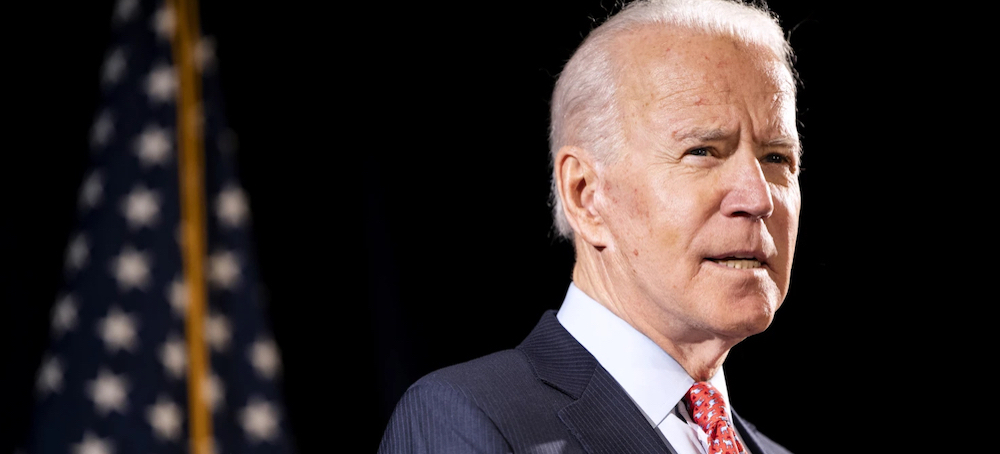Democrats Are in Power, but Republicans Are Still Setting the Political Agenda
Ben Beckett Jacobin President Joe Biden. (photo: Ryan Collerd/Getty Images)
President Joe Biden. (photo: Ryan Collerd/Getty Images) Democrats Are in Power, but Republicans Are Still Setting the Political Agenda
Ben Beckett Jacobin
Despite Democrats controlling the White House and Congress since 2020, it has largely been the Right that has taken the political initiative and set the terms of the political conversation. Expect that to get worse after November.
The GOP has managed to do that for two key reasons: first, because the dominant wing of the Democratic Party has repeatedly failed to present the country with a compelling political vision, and second, because Republicans have found ways to leverage power with increasingly undemocratic tactics.
Democrats have rightfully used their majority in Congress to investigate the serious breach of democratic norms that Donald Trump and other prominent Republicans engaged in during the January 6, 2021, insurrection at the Capitol. In contrast to many other democratic countries, it is extraordinarily rare for US politicians to face any serious legal accountability for their conduct in office. In that regard, the investigations are a welcome change to the status quo, even if they have so far proven insufficient to address the real threat to democracy that large portions of the Republican Party still present.
Yet paradoxically, even as the congressional investigation drags on, revealing more and more malfeasance at the Trump White House, and even as it creeps closer to accusing Trump himself of planning to execute a coup d’état, Trump’s approval rating with voters remains remarkably steady. In fact, Trump’s approval has risen since early 2021, when much less was known about the degree of organization and planning involved in the Capitol insurrection.
For much of this summer, Biden’s approval rating was lower than Trump’s, only returning to roughly even shortly after Biden announced a partial cancellation of student debt. In other words, the investigation might still put Trump in legal jeopardy, but so far it has done less than nothing to diminish his appeal to voters.
The investigation has kept the Democrats’ attention largely on a president no longer in power, rather than on the agenda of the one who is. Over the past two years both the substance and the internal Democratic Party debate about Biden’s key legislation grew ever more convoluted, and the parts of it that would most directly and visibly help voters were largely eliminated. Legislation like the PRO Act to make it easier to form unions — which ought to be a no-brainer in a Democrat-controlled government — has gone nowhere. Biden had to be dragged kicking and screaming into the one clear, unambiguous win of partially canceling student debt, and even there his actions were far from sufficient.
The Democrats are invested in Trump remaining the country’s center of political gravity — partly for the justifiable reason of denouncing his outrageous conduct and partly for the much-less-justifiable reason of distracting voters from the fact that they are stuck in neutral.
That paradigm suits Republicans just fine. Far from engaging in self-reflection about the civic ethics of Trumpism, the main debate within the Republican Party is whether Trump himself or Florida governor Ron DeSantis is most capable of carrying it forward. That doesn’t just mean cruel stunts from DeSantis and other right-wing governors trying to keep up with him. Since Trump’s loss to Biden, Republicans from the grassroots up have maintained a laser focus on rigging election rules and putting loyal Trump followers with little regard for the law or basic fairness into key election administration positions. We can almost see fair elections being taken away from the country in plain sight, and Democrats have done virtually nothing to stop it, neither from a legal perspective nor by working to undermine the political popularity of those who wish to do so.
Then there is by far the strongest driver of the Right’s agenda since Biden’s election: the Supreme Court. Having spent the last year revoking the right to abortion and so many other rights it is difficult to keep track, the stage is set for another term of gleefully undermining human freedom and flourishing. Not only are fair elections on the court’s chopping block, but as Vox reported, the court looks prepared to greatly reduce the government’s ability to curb pollution, prevent it from ensuring Medicaid patients receive proper care, and allow even more racial gerrymandering than it has up to now, among other cases.
Even if Democrats mustered the political will to undo these all-but-certain catastrophes legislatively, which they won’t, that would be a yearslong project of just responding to the Right to restore the status quo ante. During that time, conservatives would undoubtedly cook up new ways to inflict suffering and indignity on the country and any other putatively progressive agenda would stall.
And even that unlikely scenario assumes Democrats will maintain their congressional majority. While Democrats’ polling numbers have improved slightly from earlier this year, it still seems likely Republicans will retake the House of Representatives, if not the Senate. As Ross Barkan pointed out in New York Magazine, the House Republican Caucus that enters in 2023 will be even more radical than the one that largely tanked Barack Obama’s agenda, even as Biden is a weaker, more disorganized president. And while Republicans have spent the last two years using the bases of power they still have — the Supreme Court, state governments — to advance their agenda in a relatively cohesive way, there is no evidence that Democrats at any level of government have a real agenda at all, much less a similar strategy to realize it in the next two years.
The whole country has been stuck in a crowded elevator since Biden took office. It’s hard to move, and the company stinks. We’re talking into the emergency intercom, unsure if there’s anyone on the other end. After November, how fast will we fall?
